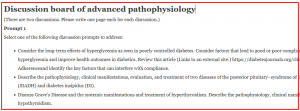Discussion board of advanced pathophysiology
(There are two discussions. Please write one page each for each discussion.)
Prompt 1
Select one of the following discussion prompts to address:
- Consider the long-term effects of hyperglycemia as seen in poorly controlled diabetes. Consider factors that lead to good or poor compliance in regimens designed to decrease hyperglycemia and improve health outcomes in diabetics. Review this article (Links to an external site.) https://diabetesjournals.org/clinical/article/24/2/71/1610/Improving-Patient-Adherenceand identify the key factors that can interfere with compliance.
- Describe the pathophysiology, clinical manifestations, evaluation, and treatment of two diseases of the posterior pituitary–syndrome of inappropriate antidiuretic hormone secretion (SIADH) and diabetes insipidus (DI).
- Discuss Grave’s Disease and the systemic manifestations and treatment of hyperthyroidism. Describe the pathophysiology, clinical manifestations, evaluation, and treatment of hypothyroidism.

Use at least one scholarly source other than your textbook to connect your response to national guidelines and evidence-based research in support of your ideas.
Prompt 2
Select one of the following discussion prompts to address:
• Describe the pathophysiology, clinical manifestations, evaluation, and treatment of polycystic ovary syndrome (PCOS).
• Discuss common causes of galactorrhea and describe the pathophysiology, clinical manifestations, evaluation, and treatment of galactorrhea.
• Describe benign prostatic hypertrophy (BPH) and discuss the pathogenesis, clinical manifestations, evaluation, and treatment of BPH.
Use at least one scholarly source other than your textbook to connect your response to national guidelines and evidence-based research in support of your ideas.
Textbook:
Pathophysiology: The Biologic Basis for Disease in Adults and Children
• Author: Kathryn L. McCance and Sue E. Huether
• Publisher: Elsevier
• Edition: 7th (2014)
Chapter 21-26
